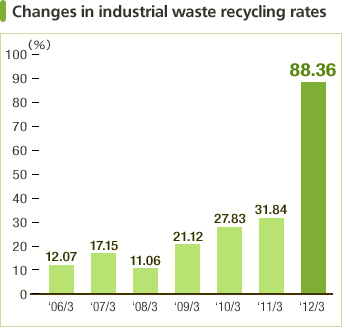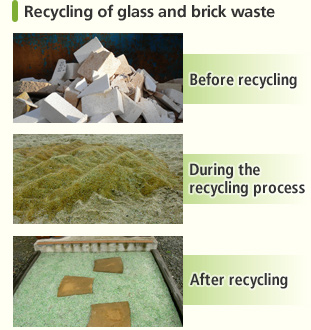Group Company (Hikari Glass Co., Ltd.)

Hikari Glass has set a zero emissions* target for its final landfill disposal rate of less than 20%, to be reached by the end of March 2012.
Most of the waste generated at Hikari Glass is sludge and discarded glass, and so a key to achieving this target is selecting a recycling company that will maximize the amount of waste that can be recycled. Therefore, during the year ending March 31, 2012, we continued to collect information from a variety of recyclers, and proceeded to make a selection and negotiate an agreement. Although the impact of the Great East Japan Earthquake reduced the processing capacity of our contracted recycler, we were able to achieve the target by reviewing the contract details and taking other measures. I think this achievement was also greatly influenced by the cooperation we received from our plants.
When we initially started zero emissions activities at Hikari Glass, our recycling rate was low, and it was sometimes hard to convince people to cooperate with recycling efforts since awareness about waste at the plants was quite low. At first we all wondered why the plants did not cooperate, but after a number of meetings, we realized that perhaps the reason was that if we promoted recycling, waste products would have to be separated more carefully, creating greater pressure on the plants and decreasing their work efficiency. From that point on, we decided that rather than making one-sided demands of the plants, we would look at things from their perspective and discuss with them to find the ways to recycle that did not add to their burdens. Perhaps as a result of this, concern about waste has grown recently, and we have also started receiving questions about how certain wastes will be recycled.
Although we have currently reached a state in which we have been able to achieve our target, there is still waste that we are unable to recycle. We see finding new recycling methods through cooperation with recycling companies as being a major challenge in future zero-emission activities. We hope to continue looking at the issues from the perspective of the plants and move forward with our efforts.


- *Zero emissions
- A concept proposed by the United Nations University in 1994 with a view to reducing waste from the whole of society to zero by recycling waste from one industry for use as resources for other industries.

